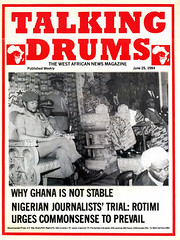In Pursuit Of Peace... (of the Grave?)
A Touch of Nokoko by Kofi Akumanyi
Mrs Thatcher, the day after, fielded through the opposition's vicious attack on the whole summit with her characteristic "whatever-you-can-do-I-can- do-much better" stance during Question Time in the British Parliament in spite of the fact that Mr Neil Kinnock's apt description of the whole summit as a definite display of "paralysis of will" might have gone down well with many a Third World country.
On the whole, President Ronald Reagan takes the cake for media manipulation. With one eye on the impending elections at home his well-planned itinerary through the Irish Republic which unearthed, according to a BBC newscaster, a new branch of his ever expanding family tree, his wife Nancy's ill-fated visit to "underprivileged children", and the Queen's abortive luncheon picture date, he succeeded in getting effective exposure while his challengers in the Democratic Party race to the White House, stumbled painfully on.
The seven leaders left London with the hope that the communique at the end of the session would be a good enough testimony of the sincerity of the Western developed world toward finding lasting solutions to the world's problems.
But it was Reagan who left an unforgettable mark on the summit with his off the cuff remarks when asked to comment on the summit shindig and demonstrations against nuclear arms stock-piling, particularly the siting of American cruise-missiles in Britain.
Quipped the President before he boarded Air Force One to Washington: he was leaving with "renewed confidence that the future belongs to the free". Again asked about his opinion on the massive demonstration organised by the Council for Nuclear Disarmament (CND) in London on 9 June, who opposed his views he paused and replied: "Well, they seem to think they have a single answer to warfare, that if we just lay down our weapons and stand back empty handed, somehow peace will come to the world. They haven't stopped to figure it might be the peace of the grave.'
This last statement must rank as the most profound observation yet by the President on this vexing issue which within the past few weeks has forced the doves and the hawks in both the House of Representatives and the Senate to put pressure on him to meet with the Russians without any pre-conditions. I have thought deeply about what he said and I am still baffled at the import of the statement. Peace as we all know is a very elusive commodity whenever it is sought in conditions of instability and socio economic turmoil.
"Si pacem vis, para bellum," advised one Latin sage many years ago when he realised that inspite of strenuous efforts by bellicose nations to live in peace, the dream was long time coming... So what did President Reagan mean by "peace of the grave"? I put the question to Prof. Simon Smith of the Academy of Peace Studies.
"The President said what?"
"That people don't know that their formula for achieving peace would only lead to the peace of the grave," I explained, "and he also scolded the London demonstrators for thinking that there is only one answer to the problem of finding peace".
"Oh, yes, that's Reagan alright" he said, "Does he realise that his method for solving the problem of nuclear war has so far only served to escalate the East-West tension?"
"Prof, don't forget that he strongly believes that the West should negotiate for peace from a position of strength and not from weakness" I reminded him "Besides he has the abortive attempts of other unforgettable world leaders as examples to go by."
"You're not referring to the two world famous figures - Mahatma Gandhi and Dr Martin Luther King, are you?"
"Yes, I am"
"Well, while the circumstances aren't the same, it must be admitted that they preached non-violence in pursuing their dream of bringing peace to the world, and what happened? They were brutally and violently cut down by assassins' bullets."
"You're damn right. That was a sad way to end up in pursuit of peace" I said.
"Sure, it does demonstrate that in this world of violence one has to build a solid wall of defence around oneself to survive," said Prof. Simon-Smith.
"But surely Prof., Reagan's solution of erecting a solid defence as a counterpoint to negotiation should not take the fight to space. The so-called Star Wars is morally untenable", I protested.
"Just hold it there mister! You've completely missed the logic in Reagan's defence strategy."
"Please tell me. I'm one among many who also appear to be completely lost."
"It's really very simple. Reagan wants peace on earth so he plans to take the next world war into space in which case everything being equal the earth may be left alone, untouched."
"Oh, I now see the general drift of the complicated war and peace strategy. But what would be the benefit to the world?"
"In that way, with a sweep of his hand, he kills two birds with one stone - he gets both peace on earth and peace of the grave!"
